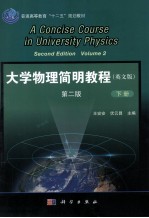

大学物理简明教程 英文版 第2版 下PDF电子书下载
- 电子书积分:11 积分如何计算积分?
- 作 者:王安安,伏云昌主编;王安安,伏云昌,陈劲波编写
- 出 版 社:北京:科学出版社
- 出版年份:2013
- ISBN:7030365542
- 页数:279 页
Part Three Thermodynamics 2
Chapter 10 The Kinetic Theory of Gases 2
10.1 The Zeroth Law of Thermodynamics 2
10.2 State Parameters,Equilibrium State,and Ideal Gas Law 3
10.3 Essential Concepts of the Kinetic Theory of Gases 6
10.4 The Representation of Pressure for Ideal Gas 8
10.5 The Average Translational Kinetic Energy and Temperature 11
10.6 The Equipartition Theorem of Energy 13
10.7 The Mean Free Path 17
10.8 The Maxwell Speed Distribution 19
10.9 The Boltzmann Distribution 23
10.10 Van der Waals Equation of State 25
Questions 27
Problems 28
Chapter 11 Fundamentals of Thermodynamics 31
11.1 Internal Energy,Heat,and Work 31
11.2 The First Law of Thermodynamics 32
11.3 Application of the First Law to Isochoric,Isobaric,and Isothermal Processes 34
11.4 The Heat Capacities of an Ideal Gas 39
11.5 Application of the First Law of Thermodynamics to Adiabatic Processes 42
11.6 Cyclical Processes and Thermal efficiency 45
11.7 Carnot Cycle and Reverse Cycle 48
11.8 The Second Law of Thermodynamics 51
11.9 Reversible and Irreversible Process,Carnot Theorem 53
11.10 Statistical Meaning of the Second Law of Thermodynamics 55
11.11 Entropy 58
Questions 63
Problems 64
Part Four Oscillation and Waves 70
Chapter 12 Simple Harmonic Motion 70
12.1 Simple Harmonic Motion 70
12.2 Period,Frequency,Amplitude,and Phase Angle of SHM 75
12.3 Kinetic and Potential Energies in SHM 78
12.4 Damped Vibration,Forced Vibration,and Resonance 79
12.5 Superposition of Two SHM with Same Direction of Vibration and Same Frequency 82
12.6 Superposition of Two SHM with Same Frequency and Directions of Vibration Perpendicular to Each Other 84
Questions 86
Problems 90
Chapter 13 Mechanical Waves 90
13.1 The Generation and Propagation of a Mechanical Wave 90
13.2 Wave Speed and Elasticity of the Medium 95
13.3 Wave Function of a Plans Simple Harmonic Wave 97
13.4 Energy,Energy Flow,and Wave Intensity 102
13.5 Huygens'Principle 105
13.6 Principle of Superposition of Waves,and Interference of Waves 106
13.7 Standing Waves 109
13.8 The Doppler Effect 111
Questions 112
Problems 114
Chapter 14 Electromagnetic Oscillations and Waves 118
14.1 LC Oscillations 118
14.2 Electromagnetic Waves 121
14.3 Energy in Electromagnetic Waves 124
14.4 The Electromagnetic Wave Spectrum 126
Questions 128
Problems 128
Chapter 15 Optics 130
15.1 Laws of Reflection and Refraction 131
15.2 The Plane Mirror and Spherical Mirrors 134
15.3 Images Formed by Refraction and Thin Lenses 137
15.4 The Coherence of Light 142
15.5 Two Beams Interference by Division of Wavefront 143
15.6 Optical Path and Optical Path Difference,a Property of Thin Lens 148
15.7 Interference by Division of Amplitude 150
15.8 Michelson Interferometer 156
15.9 Diffraction of Light and Huygens-Fresnel's Principle 158
15.10 Diffraction from a Single Slit 160
15.11 Diffraction Grating 165
15.12 Resolving Power of Optical Instruments 168
15.13 X-Ray Diffraction by Crystals 170
15.14 Polarization of Light and Malus's Law 172
15.15 Polarization by Reflection 174
15.16 Double Refraction 176
15.17 Optical Stress Analysis 179
Questions 180
Problems 181
Part Five The Modern Physics 187
Chapter 16 The Special Theory of Relativity 187
16.1 The Michelson-Morley Experiment 187
16.2 The Postulates of Special Relativity 189
16.3 The Lorentz Transformation 190
16.4 Some Consequences of the Lorentz Transformation 193
16.5 The Lorentz Transformation of Velocities 197
16.6 The Relativistic Dynamic Theory 199
Appendix 1 203
Appendix 2 204
Questions 205
Problems 206
Chapter 17 The Quantization of Light 208
17.1 Thermal Radiation and Planck's Theory of Radiation 208
17.2 The Photoelectric Effect 212
17.3 The Compton Effect 215
Questions 218
Problems 219
Chapter 18 Quantum Theory of the Atoms 220
18.1 Rutherford's Experiment and the Nuclear Atom 220
18.2 Atomic Spectra and the Bohr Model of Hydrogen 222
18.3 De Broglie's Postulate and Matter Waves 228
18.4 The Uncertainty Principle 232
18.5 The Wave Function,Schr?dinger Equation,and Born's Interpretation of Wave Functions 234
18.6 The Infinite Potential Well 238
18.7 The Hydrogen Atom and Electron Spin 241
18.8 Multielectron Atoms and the Periodic Table 244
Questions 248
Problems 249
Chapter 19 The Band Theory of Solids 251
19.1 The Crystals 251
19.2 Energy Bands in Solids 254
19.3 Metals,Insulators,and Semiconductors 256
19.4 Doping and p-n Junction 259
19.5 Laser 262
Questions 265
Appendix 1 The International System of Units 267
Appendix 2 Some Fundamental Constants of Physics 269
Words 270
Answers to Problems 276
- 《高级英语阅读与听说教程》刘秀梅编著 2019
- 《大学计算机实验指导及习题解答》曹成志,宋长龙 2019
- 《看图自学吉他弹唱教程》陈飞编著 2019
- 《激光加工实训技能指导理实一体化教程 下》王秀军,徐永红主编;刘波,刘克生副主编 2017
- 《AutoCAD 2019 循序渐进教程》雷焕平,吴昌松,陈兴奎主编 2019
- 《少儿电子琴入门教程 双色图解版》灌木文化 2019
- 《Photoshop CC 2018基础教程》温培利,付华编著 2019
- 《大学生心理健康与人生发展》王琳责任编辑;(中国)肖宇 2019
- 《剑桥国际英语写作教程 段落写作》(美)吉尔·辛格尔顿(Jill Shingleton)编著 2019
- 《大学英语四级考试全真试题 标准模拟 四级》汪开虎主编 2012
- 《指向核心素养 北京十一学校名师教学设计 英语 七年级 上 配人教版》周志英总主编 2019
- 《《走近科学》精选丛书 中国UFO悬案调查》郭之文 2019
- 《北京生态环境保护》《北京环境保护丛书》编委会编著 2018
- 《中医骨伤科学》赵文海,张俐,温建民著 2017
- 《美国小学分级阅读 二级D 地球科学&物质科学》本书编委会 2016
- 《指向核心素养 北京十一学校名师教学设计 英语 九年级 上 配人教版》周志英总主编 2019
- 《强磁场下的基础科学问题》中国科学院编 2020
- 《小牛顿科学故事馆 进化论的故事》小牛顿科学教育公司编辑团队 2018
- 《小牛顿科学故事馆 医学的故事》小牛顿科学教育公司编辑团队 2018
- 《高等院校旅游专业系列教材 旅游企业岗位培训系列教材 新编北京导游英语》杨昆,鄢莉,谭明华 2019
